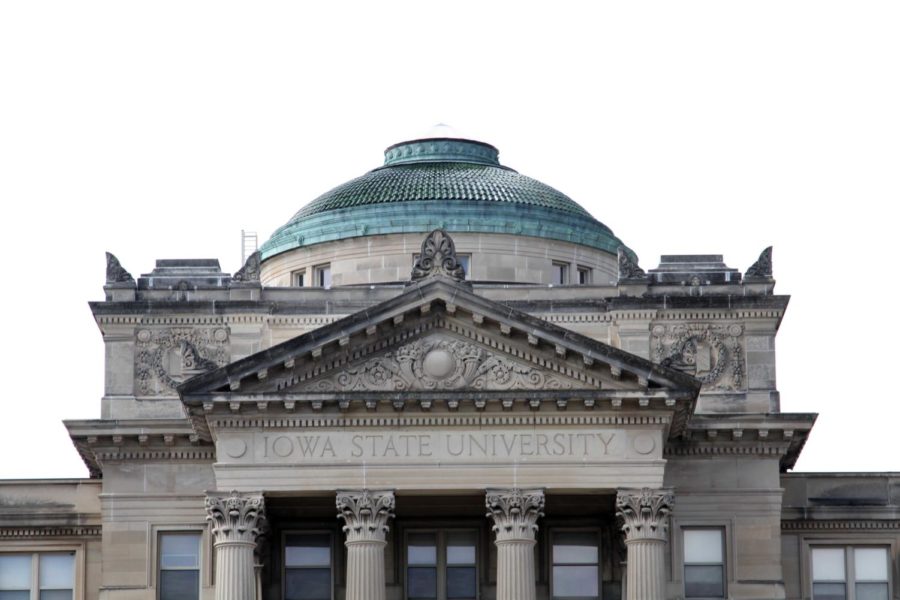- App Content
- App Content / News
- News
- News / Diversity
- News / Politics And Administration
- News / Politics And Administration / Campus
Recent removal of affirmative action guidelines won’t affect Iowa State
Beardshear Hall from Central Campus on Sept. 19.
July 16, 2018
Iowa State University will not be affected by President Donald Trump’s recent decision to rescind some federal guidelines for affirmative action says Iowa State Office of Admissions director.
The Obama-era standards on race-based admissions policies known as affirmative action are being rescinded following a decision from the Trump administration to scrap guidelines relating to college admissions seen to be outdated.
This decision led to the Justice Department announcing the removal of 24 federal guidelines in a statement calling them “unnecessary, outdated, inconsistent with existing law, or otherwise improper.”
Seven of the 24 guidelines also directed the Education Department’s Office for Civil Rights to have school superintendents and colleges consider race in admissions practices for purposes of diversity.
While this decision may impact other campuses, Director of the Office of Admissions at Iowa State Katharine Suski said the removed guidelines will not change the way Iowa State operates.
“The recent affirmative action statement will not impact admission of undergraduate students at Iowa State in any way,” Suski said.
Being a public university, Iowa State has to follow specific statewide guidelines on admissions, and Suski said Iowa’s guidelines don’t consider race.
“As a public university in Iowa, we utilize the Regent Admission Index (RAI) in making admission decisions,” Suski said. “This formula is very transparent and objective, and does not consider race. It considers academic factors only-GPA, class rank, core courses and standardized test scores.”
While some students get into Iowa State with an RAI below the designated threshold of approval, those decisions don’t use race as a deciding factor.
“We admit a small number of students who fall below the stated RAI, but those decisions are made considering only academic factors, as well,” Suski said. “No changes will be made to our requirements or process as a result of the recent statement.”
The decision to rescind some of the guidelines is happening alongside a court battle over Harvard’s admissions policies. Students for Fair Admissions, Inc. accuses Harvard of limiting the number of accepted admissions of Asian-American students. They allege Harvard violates the constitutional and civil rights of the individuals they represent as the school accepts federal funds.
They support their claim citing the 1977 Supreme Court decision saying racial quotas violate the Constitution’s Equal Protection Clause. In the decision they did outline that admissions to universities can look at race as a factor in admitting students.
In a statement on their website, Harvard denied claims saying they discriminated against applicants of any race or ethnicity in their admissions.
“We will continue to vigorously defend the right of Harvard, and other universities, to seek the educational benefits that come from a class that is diverse on multiple dimensions, from its capacity for academic excellence to its ability to help create a campus community that gives each student the opportunity to learn from peers with a wide variety of academic interests, perspectives, and talents,” the statement said.
The court case also comes at a time when a recent Supreme Court vacancy could reverse 40 years of constitutional precedent in the situation that an affirmative action case reaches the high court.
“Four decades of case law make clear that race and ethnicity can be one of many factors that universities can consider during the admissions process,” said Peter McPherson, president of the Association of Public and Land-grant Universities, in a statement on July 6. “Public universities will continue to operate in accordance with the Constitution, state law, and past court rulings to ensure they appropriately foster a diverse campus to the benefit of all.”
On April 6, three months before the vacancy and prospect of Justice Kennedy, who was the swing vote on many social issues like affirmative action, being off the court, the Justice Department filed court papers notifying the judge of its “substantial interest” in the suit.
Students for Fair Admissions, Inc. has also sued the University of North Carolina at Chapel Hill and the University of Texas at Austin accusing them of similarly discriminatory admissions practices.
















